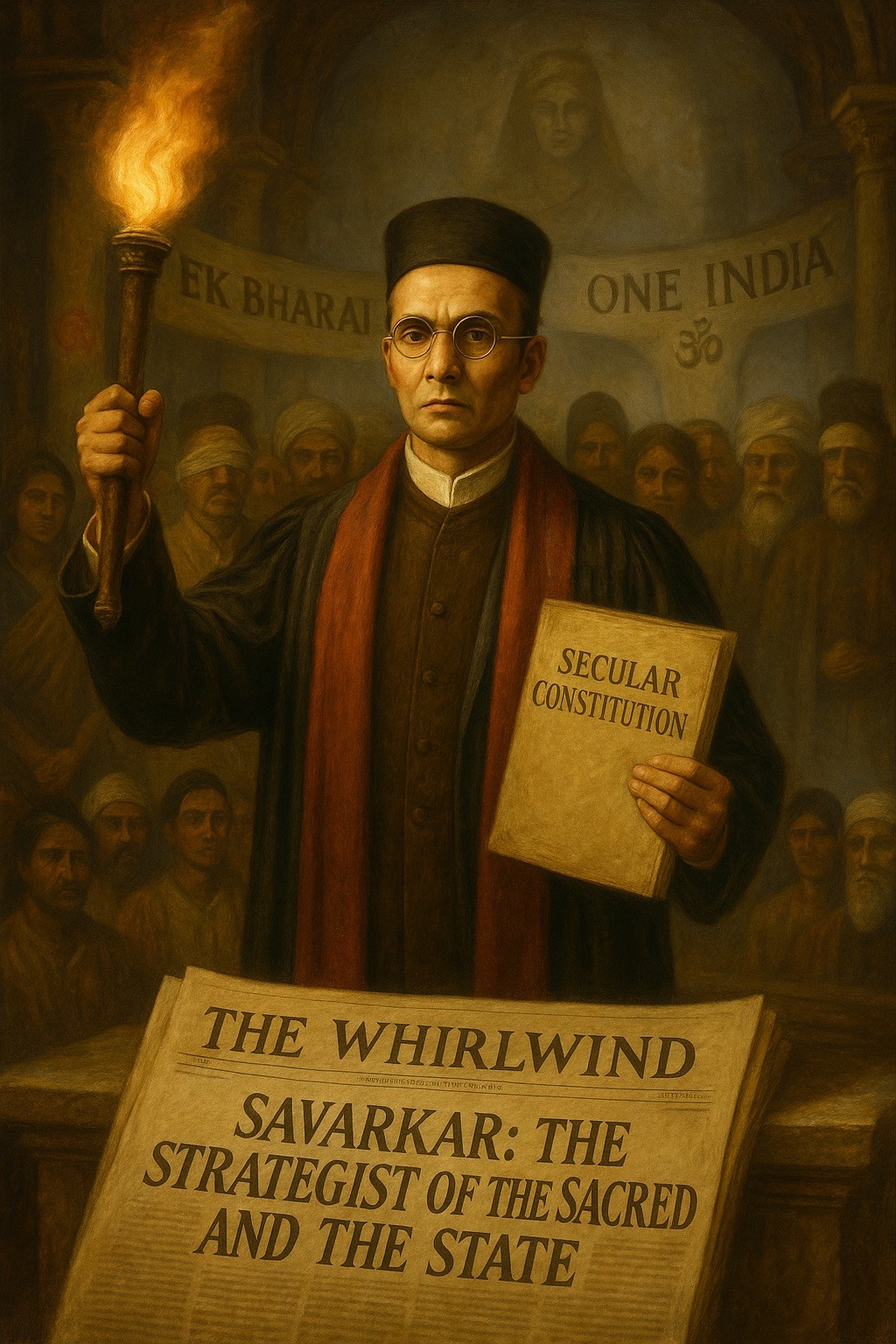Savarkar’s Philosophy & Worldview, Part 6; Savarkar’s Agnosticism, (3/4)
In the ongoing exploration of Vinayak Damodar Savarkar’s ideological framework, his views on the relationship between religion and politics offer a compelling lens through which to understand his agnosticism. While Hinduism undeniably played a central role in Savarkar’s thinking, it was not rooted in spiritual devotion or orthodox traditionalism. Instead, his approach was pragmatic, secular, and strategic, aimed at fostering a collective identity and advancing his socio-political aspirations. This perspective further underscores Savarkar’s agnosticism, revealing a nuanced understanding of religion as a tool for nation-building rather than a matter of personal faith.
Religion as a Strategic Instrument
Savarkar recognized the immense power of religious sentiment, famously stating that the man cannot exist without religion. Religion is a source of immense strength. However, his invocation of Hinduism was not an endorsement of its spiritual or theological dimensions. Rather, he saw it as a cultural and social framework that could unify the Indian people. By emphasizing certain elements of Hinduism as a “leading culture” [Leitkultur] Savarkar sought to create a sense of belonging and shared identity among his compatriots. This was not about establishing Hinduism as a state religion but about leveraging its cultural resonance to construct an “imagined nation.”
His approach was deeply influenced by Western ideas, particularly the principle of separating religion and politics. Drawing inspiration from Thomas Jefferson’s concept of a “wall of separation” between church and state, Savarkar viewed politics as a means to serve the nation and promote societal progress. He also aligned with Giuseppe Mazzini’s critique of those who prioritized religious rituals over national service. For Savarkar, true religious devotion lay in serving the nation, not in performing empty rituals.
A Secular Vision of National Service
Savarkar’s vision was clear: religion and politics were distinct domains. While he acknowledged the private role of religion in an individual’s spiritual life, he firmly believed that public life should be guided by secular and civic principles. In his proposed constitution for a postcolonial India, Savarkar articulated this vision with remarkable clarity:
- Equal Rights for All Citizens: Regardless of caste, creed, race, or religion, all citizens would have equal rights and obligations, provided they pledged allegiance to the Indian state.
- Freedom of Conscience and Worship: Fundamental rights, including religious worship, would be protected, subject only to restrictions based on public peace, order, or national emergencies—never on religious or racial grounds.
- One Person, One Vote: Democracy would be upheld without discrimination based on religion or caste.
These principles reflect Savarkar’s commitment to secularism and his belief in the separation of religion from the public sphere. Yet, he was acutely aware of the challenges posed by religiosity, particularly when reinforced by orthodox forces and religious scriptures. He feared that such influences could hinder social and political progress, which is why his approach remained firmly rooted in a secular-materialistic interpretation of social reality.
The Paradox of Religious Instrumentalization
While Savarkar advocated for the separation of religion and politics, he did not shy away from politically charging certain religious festivities and rituals. This apparent contradiction highlights the complexity of his ideology. On one hand, he sought to construct a unified national identity by drawing on shared cultural and religious symbols. On the other hand, he resisted the encroachment of religious dogma into the political sphere.
This duality underscores Savarkar’s agnosticism. For him, religion was not a matter of personal belief but a strategic tool for nation-building. His emphasis on Hinduism was not about spiritual conviction but about harnessing its cultural power to foster unity and belonging.
Final Thoughts: A Pragmatic Agnostic
Savarkar’s views on religion and politics reveal a pragmatic agnosticism that prioritized national unity and progress over spiritual or theological concerns. By separating the private sphere of religious belief from the public sphere of civic duty, he sought to create a secular, inclusive, and democratic India. His vision remains a testament to the complexities of navigating religion and politics in a diverse and pluralistic society.
In the end, Savarkar’s agnosticism was not a rejection of religion but a reimagining of its role in public life. It was a call to harness the cultural power of religion for the greater good of the nation, while ensuring that the state remained secular and inclusive. This delicate balance continues to resonate in contemporary debates about the relationship between religion and politics, making Savarkar’s ideas as relevant today as they were in his time
What are your thoughts on Savarkar’s approach to religion and politics? Do you think his secular vision holds lessons for modern societies? Share your views in the comments below!
Sources:
PHADNIS, Pankaj K. 2002. Freedom Struggle. The Unfinished Story. Festschrift (Dedicated to the Nation in Memory of Swatantryaveer Vinayak Damodar Savarkar). Abhinav Bharat, registered Charitable Trust: Mumbai (Bombay).
PHAKE, Sudhir/PURANDARE, B. M. and Bindumadhav JOSHI. (Eds.). 1989. Savarkar. Savarkar Darshan Pratishtnah (Trust): (Bombai) Mumbai.
PHADTARE, T. C. 1975. Social and Political Thought of Shri V.D. Savarkar. A Thesis submitted to the Marathwada University for the Degree of Doctor of Philosophy. Unpublished: Aurangabad.
SAVARKAR, Vinayak Damodar. 1945. Hindu Rashtravad. Being an Exposition of the Ideology & Immediate Programme of Hindu Rashtra as outlined by Swatantrayaveer V.D. Savarkar. Rohtas Printing Press: Rohtak. (Collected & Edited by Satya Parkash).


Leave a Reply